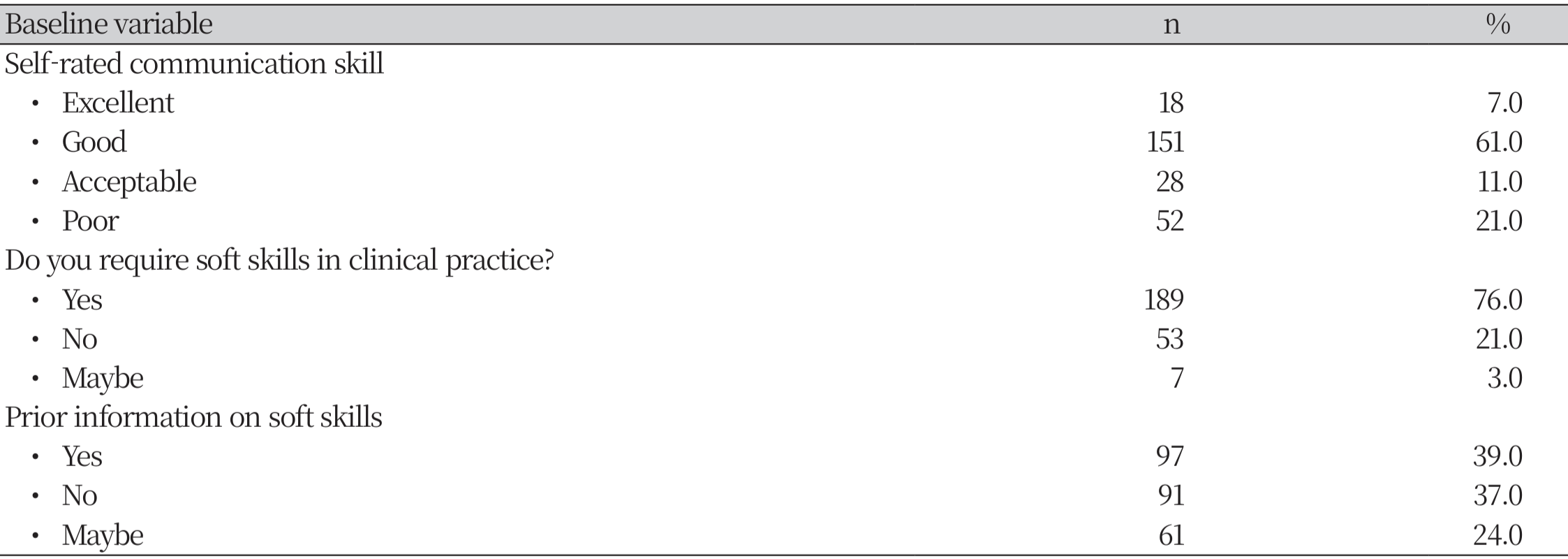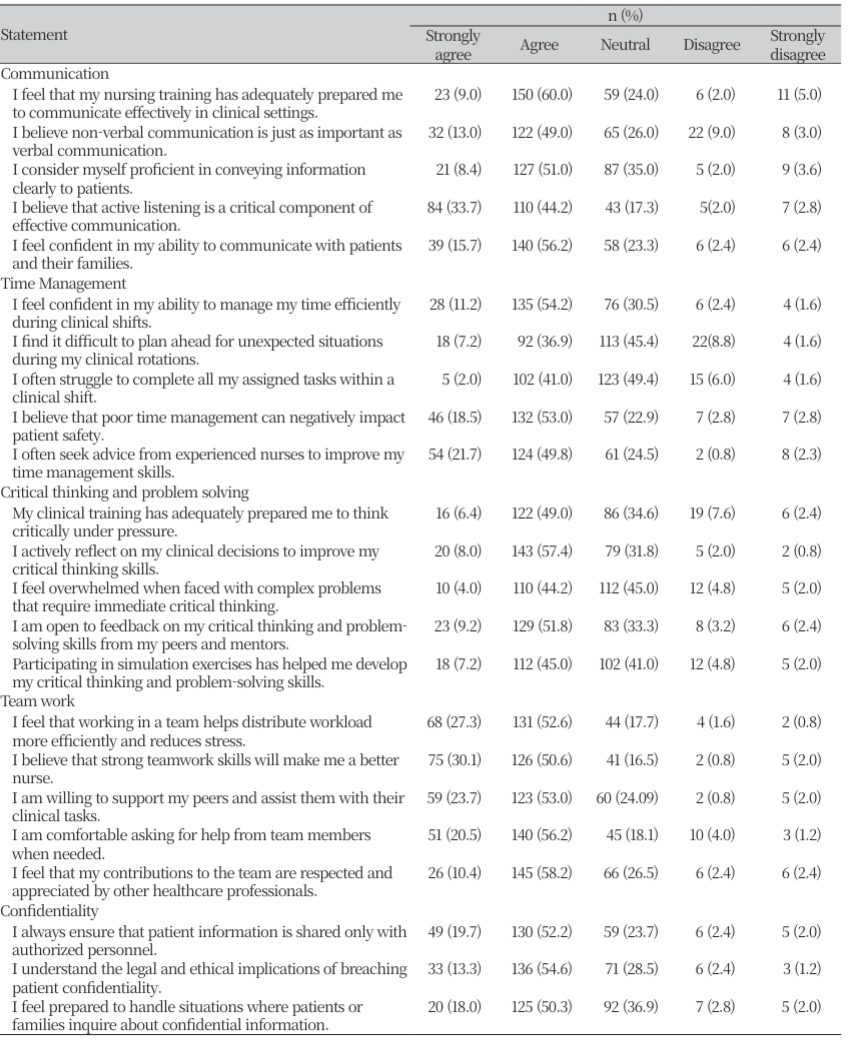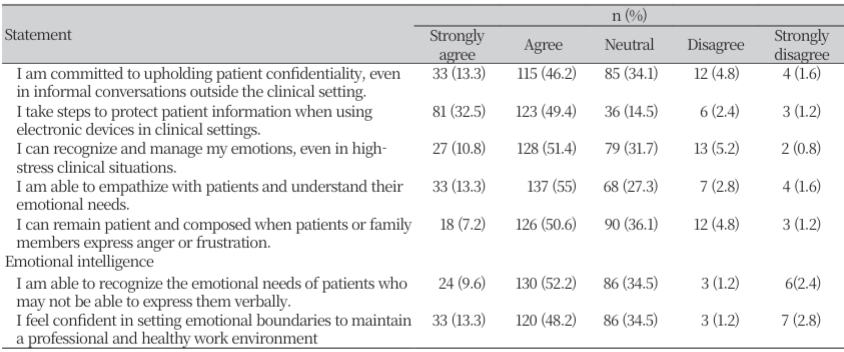Introduction
In the evolving landscape of healthcare, the emphasis on soft skills in nursing has become increasingly paramount. While technical knowledge and clinical expertise form the backbone of nursing education, the ability to communicate effectively, empathize with patients, and collaborate with interdisciplinary teams can significantly enhance patient care outcomes. In the realm of clinical practice, soft skills encompass a range of interpersonal attributes that are essential for effective patient care and collaboration among healthcare professionals [1]. These skills include communication, empathy, teamwork, and problem-solving, which facilitate better interactions between nurses and patients. For instance, strong communication skills enable nurses to convey information clearly and listen actively to patient concerns, fostering trust and understanding [2]. In the modern-day healthcare delivery system, acquiring soft skill competencies becomes increasingly important and relevant for graduate nurses [1-2]. Furthermore, employers need new nursing graduates who possess a balance between technical skills and soft skills to function in multidisciplinary teams with expanding responsibility in the current clinical setting [3].
These skills are particularly important in health science professionals, due in part to the nature of their profession, which involves interpersonal contact with patients and families [4]. These professionals are required to have a technical background that includes reasoning and critical judgment, as well as competence in areas such as communication, teamwork, critical thinking, time management, problem solving, confidentiality and decision-making, among others [5-6].
The research conducted consistently highlights the critical role of soft skills—such as communication, teamwork, emotional intelligence, and critical thinking in nursing education and clinical practice [7]. Nurse educators and healthcare leaders increasingly recognize that the development of these non-technical competencies is essential for effective interpersonal interactions, collaboration within multidisciplinary teams, and the delivery of high-quality patient care [7-8]. While numerous strategies for soft skills development have been identified including collaborative learning, experiential learning, and reflective practices, there remains a widely acknowledged gap between the recognized importance of soft skills and their systematic integration into nursing curriculum [8-9]. Qualitative studies have further revealed that nursing students often underestimate the value of soft skills early in their education, only realizing their significance during clinical placements or internships. Despite these insights, many programs still prioritize psychomotor and technical skills over soft skills, and students frequently report insufficient exposure to structured soft skills training [10-11].
Taking into consideration these persistent gaps and the evolving demands of modern healthcare, the study was undertaken to assess the perception of nursing students’ regarding the necessity of soft skills in their clinical.
Methods
Research design
A cross-sectional descriptive research design was employed to explore nursing students' perceptions regarding the need for soft skills in clinical practice.
Participants
The study was conducted among 249 nursing students from a selected nursing college in Mangaluru, Karnataka, India. The inclusion criteria for participation were students currently pursuing either in their first, second, or third year of Bachelor of Nursing degree. A convenient sampling technique was used to recruit participants who were available and willing to participate in the study during the data collection period.
Instruments
Data were collected using a structured, self-administered questionnaire, which was developed based on review relevant literature from CINAHL, PubMed/MEDLINE, focusing specifically on articles related to soft skills in nursing education and clinical practice. Key domains such as communication, team work, critical thinking and problem-solving, confidentiality, emotional intelligence, and time management were identified from relevant articles [1,3,5,7,10-15] published between 2017 and 2025. The questionnaire consisted of two parts:
Part I gathered baseline demographic and academic information, including age, gender, placement of study, perceived importance of soft skills in nursing, self-rating of communication skills, and prior information on soft skills training.
Part II the structured 5-point rating scale was developed by the principal investigators, a Professor (Obstetrics and Gynaecology Department) and Ph.D. scholar under the Indian Nursing Council alongside an Assistant professor from the Mental Health Nursing Department. Both researchers possess recognized academic qualifications (Masters in nursing), ensuring the instrument was developed with both clinical expertise and academic rigor aligned with Indian nursing education standards. The 5-point rating scale with 30 items to measure student nurses’ perceptions of the need for soft skills in clinical practice. The scale covered six subdomains: communication (5), team work (5), critical thinking and problem-solving (5), time management (5), confidentiality (8), and emotional intelligence (2). Each item was rated on a scale where, for positive statements, responses ranged from 'strongly agree' (5) to 'strongly disagree (1)’. Reverse scoring was applied to negatively worded items.
The instrument was reviewed by a panel of seven subject matter expert, yielding a Cronbach’s alpha value of 0.87, indicating a high level of internal consistency. A pilot study was conducted prior to the main data collection to test the feasibility and clarity of the tool.
Data collection and analysis
Data collection was conducted over a two-month period from September 3rd to October 31st, 2024. The study was carried out at Masood College of Nursing, Mangaluru, Karnataka, India and included first-, second-, and third-year BSc Nursing students. A total of 249 students from the college participated. Participants were approached in person during scheduled class sessions where the study objectives were explained, and written informed consent was obtained. The self-administered questionnaire and the researcher-developed 5-point rating scale assessing perceptions of the need for soft skills in clinical practice were distributed for independent, anonymous completion. Completed questionnaires were collected on-site. The compiled data were entered into a master datasheet and analyzed using SPSS version 23.0. Descriptive statistics summarized demographic variables and item responses, while inferential statistics evaluated associations between variables.
Ethical consideration
This study was reviewed and approved by the Institutional Ethical Committee of Masood Educational and Charitable Trust (MECT IEC) with the approval number MECT/IEC/25/2024. Participants were assured of the confidentiality of their responses and their right to withdraw from the study at any point of time.
Results
A total of 249 participants were included in the study (Table 1). The mean age of the participants was 20.14 years (SD ± 1.37). The majority were female, 213(85.5%), while 36(14.5%) were male. Regarding their year of study placement, 75(30.0%) were in the first year, 90(36.0%) in the second year, and 84(34.0%) in the third year. When asked to rate their communication skills, 18(7.0%) rated them as excellent, 151(61.0%) as good, 28(11.0%) as acceptable, and 52(21.0%) as poor. Most participants, 189(76.0%), agreed that soft skills are required in clinical practice, while 53(21.0%) responded negatively and 7(3.0%) were unsure. Regarding prior information on soft skills, 97(39.0%) reported having received information, 91(37.0%) had not, and 61(24.0%) were uncertain.
Table 2 displays subjects’ perception of need for soft skills in clinical practice under the domains:
Communication: Most nursing students felt their training adequately prepared them to communicate effectively in clinical settings, with 150(60%) agreeing or 23(9%) strongly agreeing. They recognized the importance of both verbal and non-verbal communication, and valued active listening as a critical communication skill. Confidence in communicating with patients and families was also high, with 140(56.2%) expressing agreement or 39(15.7%) strong agreement.
Time management: A majority reported confidence in managing time efficiently during clinical shifts 135(54.2%) in agreement or 28(11.2%) in strong agreement. However, many acknowledged difficulties in planning for unexpected situations [113(45.4%) neutral; 92(36.9%) agree or 18(7.2%) strongly agree on difficulty]. Students were aware that poor time management could negatively impact patient safety, with 132(53.5%) agreeing and 46(18.5%) strongly agreeing. They often sought advice to improve these skills.
Critical Thinking and Problem Solving: About half of the participants agreed that their clinical training adequately prepared them for critical thinking under pressure. They valued reflection on clinical decisions and were open to feedback. While some felt overwhelmed dealing with complex problems (45% neutral), a majority actively engaged in simulation exercises to develop these skills.
Teamwork: Teamwork was widely regarded as beneficial, with over 131(52.6%) agreeing and 68(27.3%) strongly agreeing that it helps distribute workload efficiently and reduces stress. Similarly, 126(50.6%) agreed and 75(30.1%) strongly agreed that strong teamwork skills would improve their nursing practice. Willingness to support peers and ask for help was high, reflecting positive team dynamics.
Confidentiality: Most students were aware of the importance of upholding patient confidentiality, sharing information only with authorized personnel, and appreciating the ethical and legal implications. Commitment to protecting patient information, even outside formal settings, was strong among participants.
Emotional Intelligence: Students reported abilities in managing emotions under stress, empathizing with patients, and maintaining patience with frustrated patients. The majority felt confident recognizing patients’ unexpressed emotional needs and setting emotional boundaries professionally.
Table 3 shows that among the six domains assessed, the highest mean score was observed in teamwork (19.68 ± 3.08; 78.72%), indicating a strong perception of the value of collaboration in clinical practice. This was followed by communication (18.69 ± 2.99, 74.76%), confidentiality (18.59 ± 3.04, 74.36%), and emotional intelligence (18.32 ± 2.81, 73.28%). The lowest score was in time management, with a mean of 16.62 ± 1.75, corresponding to a mean percentage of 66.48%, indicating a potential area of weakness among students.
The overall mean score across all domains was 109.68 ± 13.10 out of a maximum of 150, with a mean percentage of 73.12%, reflecting a generally positive perception toward the need for soft skills in clinical nursing practice.
Discussion
The present study highlights that nursing students overwhelmingly recognize the importance of soft skills in clinical practice, with the majority perceiving strong communication abilities and acknowledging the need for further development in areas such as time management, critical thinking, and teamwork. This is consistent with findings from similar studies in other regions, which have demonstrated that soft skills are integral to delivering high-quality patient care and professional growth in nursing [12].
A substantial proportion of students 189(76%) felt that soft skills are required in their clinical practice at the same time 91(37%) students responded that they have no prior information on soft skills. This suggests a possible overestimation of competency, as self-reported skills may not always align with actual clinical performance. Notably, 37% of students reported having no prior exposure to soft skills training, indicating a critical gap in nursing education. These findings are consistent with studies from Ghana1 and Chennai [14] where nursing students acknowledged the necessity of soft skills but lacked structured training.
Most students (65.46%) believed they managed time efficiently, yet 71.48% agreed that poor time management could compromise patient safety. This dichotomy suggests that while students understand the theoretical importance of time management, they may struggle with practical application in high-pressure clinical environments. Similar concerns were reported in a study from Chennai [14], where 43.9% of students emphasized the need for better time management strategies in nursing education.
Over half (52.2%) of the students felt that simulation exercises enhanced their critical thinking and problem-solving abilities. However, nearly half (48.19%) reported feeling overwhelmed in situations requiring quick decision-making. This aligns with previous research [1,14] which found that while simulation training improves confidence, students still experience stress in real-life emergencies. Incorporating more high-fidelity simulations and structured debriefing sessions could help bridge this gap.
The mean perception score (73.12%) indicates a generally positive attitude toward soft skills, with subdomains like teamwork (19.68 ± 3.08) and communication (18.69 ± 2.99) scoring highest. However, the variation in scores suggests that some areas such as emotional intelligence (18.32 ± 2.81) and critical thinking (17.75 ± 2.63) require further reinforcement. These findings are congruent with studies [13-16] that advocate for a more balanced integration of soft skills in nursing curriculum. The evidence suggests that embedding soft skills training as a core, ongoing component of the nursing curriculum—rather than as optional or supplementary—can better prepare students for the complex interpersonal and professional demands of modern healthcare [13,15].
The study has certain limitations that should be considered, the study was conducted in selected nursing college within Mangaluru, which may limit the generalizability of the results and it captures perceptions at a single point of time and does not account for changes over the course of the students' academic or clinical training. Data were collected through self-reported questionnaires, which may be subject to response bias, including social desirability and overestimation of one’s soft skills.
The study recommends nursing curriculum should be revised to explicitly integrate soft skills training and assessment, conduction of regular workshops and professional development programs for nurse educators to enhance their ability to teach and assess soft skills effectively and incorporation of simulation-based learning, role-play, and scenario-based exercises which may strengthen the soft skills in realistic clinical contexts.
Conclusion
It is widely acknowledged that nursing students' perception of soft skills in clinical practice is essential for their overall competency and efficacy as future healthcare professionals. In their clinical experience, nursing students typically recognize the value of communication, teamwork, critical thinking, time management, problem solving, confidentiality and decision-making. These abilities are frequently viewed as a supplement to technical or clinical expertise, improving patient happiness, interdisciplinary teamwork, and patient outcomes. Soft skills would lead to the improved performance and skills in handling patient. The findings of this study underscore the importance of soft skill training in nursing education, highlighting the significant relationship between soft skills and nursing students' clinical performance, communication effectiveness, and future career success.






